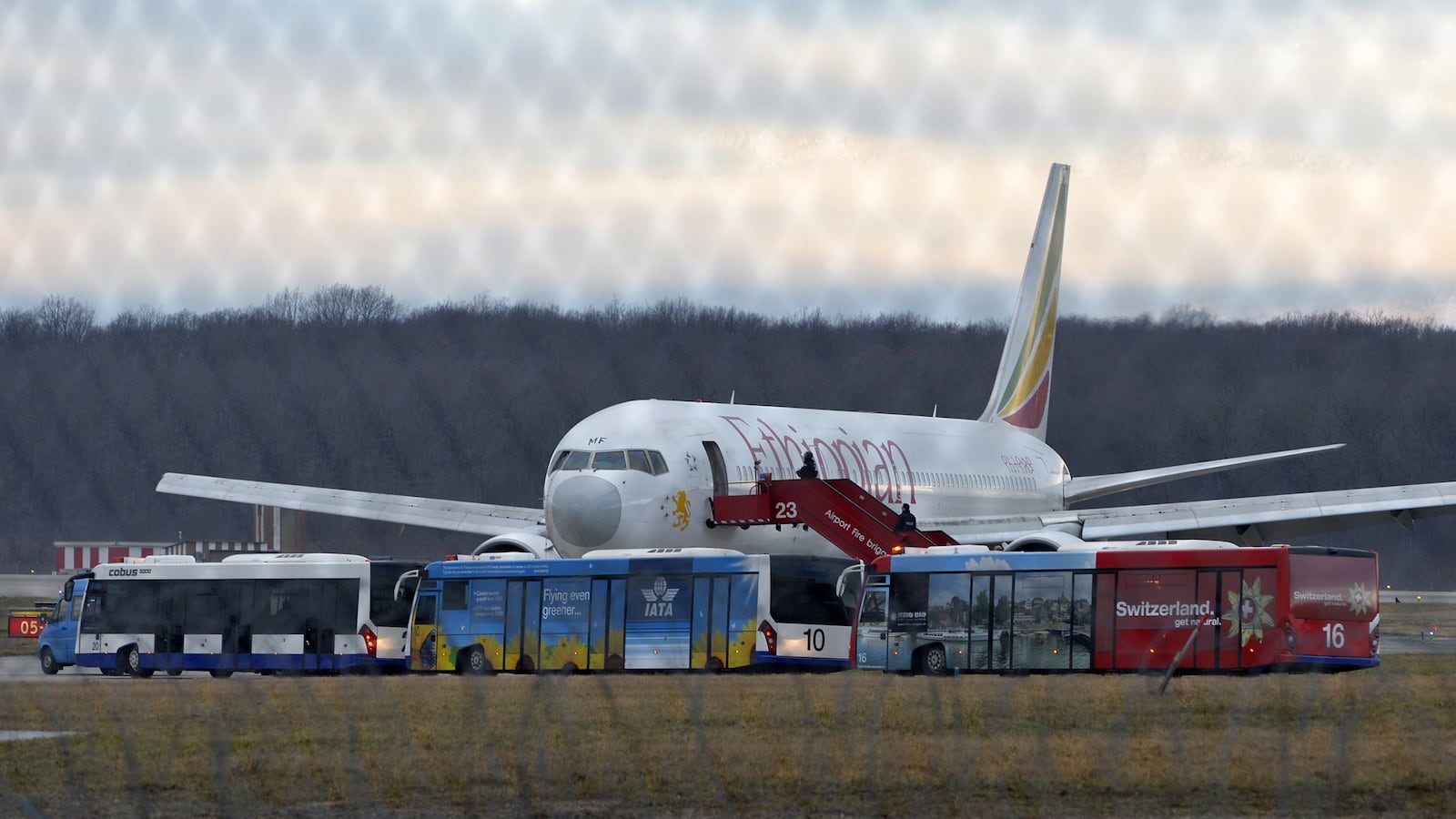One can only imagine the level of desperation a person has to have in order to hijack his own airplane. But such, apparently, was the case of Hailemedhin Abera, an Ethiopian Airlines co-pilot who commandeered his Boeing 767-300 jet on a flight from the Ethiopian capital of Addis Ababa to Rome early Monday morning. The flight left Addis at 12:30 am and was expected to arrive in Italy at 4:40 am local time. Instead, after the first officer left the cockpit to use the restroom shortly after takeoff, Abera allegedly locked the security door—setting off the foolproof hijacking signal—and headed for Switzerland.
The signal, standard on all aircraft, set off a series of alarms at air traffic control towers in the area. Two Italian Typhoon military jets were deployed to escort the passenger plane to Switzerland and two French military jets were on standby to escort it through French airspace. As the aircraft circled the airport in Geneva, the co-pilot made his demands. “And you have to give us lastly permission on board for asylum,” the co-pilot asked the tower, according to a tape of the interaction released to the Swiss media. “Sorry, but we are still waiting for the response,” the tower officer replied. “We are trying our best to get you the response, sir.”
The plane landed safely in Geneva, Switzerland at 6:02 am, with less than half an hour worth of fuel onboard, according to Geneva authorities. The passengers (139 Italians, 11 Americans, 10 Ethiopians and four French nationals) were then told to raise their arms above their heads as they left the aircraft, which was parked at a safe distance from the main terminal. After being searched for weapons and explosives, they were escorted to the terminal. The co-pilot crawled out of the cockpit window and lowered himself to the ground on a rope and was promptly arrested. Passengers were then bussed from Geneva to Milan, Italy, and those whose final destination was not Milan caught a chartered flight to Rome. “The hijacking began while we were still over Sudan,” passenger Francesco Cuomo, 25, told Italian news service ANSA. “I thought that the co-pilot was crazy, from what I understand the pilot was shut out from the cockpit while he went into the bathroom. Then I realized [we were] outside of Italy when I recognized the Alps. But when we started to circle over Geneva I was really terrified.”
Cuomo said that passengers were woken up about an hour into the flight when the aircraft began to bounce. At that time the main pilot was attempting to enter the cockpit, but Cuomo said that the co-pilot then told him to stop or he would “crash the plane.” Oxygen masks were deployed and the passengers spent the rest of the flight in a state of high anxiety, according to Cuomo. "A message was transmitted by the loudspeakers in poor English, but the threat to crash the airplane was clearly understood,” he said.
Ethiopian Airlines issued a statement apologizing for the incident. “The cause of the diversion of the flight is under investigation. Ethiopian Airlines has made all the necessary arrangements to ensure that its esteemed passengers are being properly handled while in Geneva and can proceed to their intended destinations, to Rome and Milan, at the earliest,” according to the statement. “Ethiopian Airlines wishes to apologize to its esteemed customers for the inconvenience caused by this diversion.”
The incident underscores the extreme measures being taken by North Africans to reach Europe. While the Ethiopian airlines flight was making its way to Switzerland, more than 500 people had been spotted in the waters between the North African Coast and Italy making their way to Lampedusa by dangerous fishing boats. Monday’s was the eighth hijacking of an Ethiopian aircraft by a pilot attempting to gain asylum in the last 25 years, according to the International Organization for Migration. In 1996, 125 people perished when their hijacked Ethiopian Airline jet ran out of fuel over the Indian Ocean while the pilots and several passengers were seeking asylum in Australia.
“The pilot’s actions were motivated by the fact that he feels threatened in his county and wants to make an asylum claim in Switzerland,” Philippe Grangean, Swiss police spokesman told reporters in Geneva. “His crime will not necessarily impact his asylum application, but it is unlikely he will be granted asylum given Switzerland’s recent decision to limit entry into the country.” But because hijacking in Switzerland carries a jail term of 20 years, it is very likely that the co-pilot will get to stay in Switzerland for a very long time.






